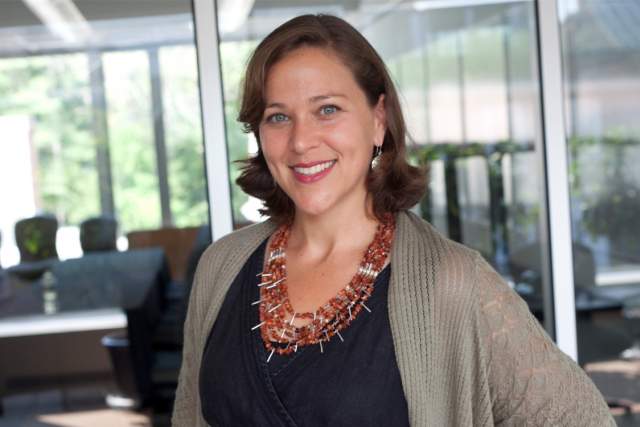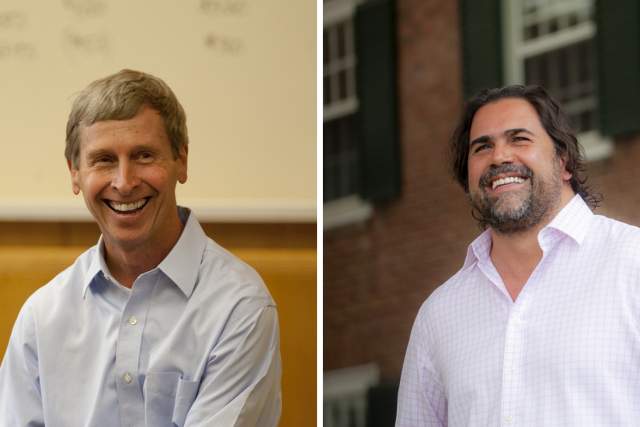The Tuck Class of 2022 has announced this year’s recipients of the annual Teaching Excellence Awards.
For teaching in the core curriculum, students chose Associate Professor Emily Blanchard, who teaches Global Economics for Managers (GEM). In the elective curriculum, students selected Assistant Professor of Business Administration Ramon Lecuona, who teaches Strategy in Emerging Markets. Blanchard won this award in 2016, and Lecuona won it in 2020.
The Teaching Excellence Awards were set up by the Class of 2011 to “celebrate the learning environment at Tuck by honoring the faculty who, in the eyes of their students, have made an outstanding contribution to the quality of the educational experience.” Each year, an academic representative from the graduating class surveys his or her classmates about their favorite teachers and meets with a committee to examine the comments and data and select the winners.
Blanchard, who is on temporary leave from Tuck to serve as the Chief Economist of the U.S. Department of State, has been teaching GEM with her Tuck colleagues for more than 10 years, and it is often mentioned by students as a highlight of their Tuck experience. Every session in the course combines foundational economic concepts with timely application to current events. The class draws on a diversity of materials, from a textbook written specifically for GEM and an interactive “gamified” study tool developed by former students, to cases and news articles from The Economist, the New York Times, the Wall Street Journal, or the Financial Times.
The way Emily makes globalization and economics so relevant and relatable is honestly incredible … I now use the skills and concepts she taught me every single day.
Blanchard describes her classroom style as “highly interactive lectures,” and she frequently calls on students to engage with the material and each other in rapid-fire format. “I have high expectations of Tuck students, and I think Tuckies appreciate the respect and confidence inherent in those expectations,” she said.
Ultimately, the goal of GEM is to give everyone foundational fluency and excitement for understanding the global economy—why markets rise and fall, how governments respond, what central banks do, and how managers can adapt to changes in the global marketplace. Because the world is complex, “there’s rarely one single right answer,” Blanchard noted, adding with a grin “but there are plenty of wrong ones.” GEM is designed to give students tools and awareness to identify shoddy narratives and to focus instead on the evidence and information that will help them make critical, informed decisions in a rapidly changing economic environment.
These are a few student comments on Blanchard’s teaching in GEM:
- “Emily Blanchard brings passion into her classroom every day. After a challenging and busy Fall A and B, her warmth and energy are greatly appreciated at the start of the winter term in GEM. She honors adult learners, many of whom are in the thick of recruiting season, by learning each of our names, providing diverse course materials, being accessible for office hours, and anticipating students’ needs. The foundation she built in the core was essential in the way I interpreted class material in several electives I took this year. I am incredibly grateful for Professor Blanchard.”
- “Professor Blanchard was clearly passionate about GEM and economics as a whole. She made the topics and principles much easier to understand and made things more relatable. She’s one of my best professors at Tuck, hands down!”
- “The way Emily makes globalization and economics so relevant and relatable is honestly incredible — as someone with basically no economics background, I feel like I finally understand what’s going on in the global economy! I now use the skills and concepts she taught me every single day.”
Ramon Lecuona has been teaching at Tuck since 2018 and has a unique background that includes a Master’s in Public Policy from Harvard, a Ph.D. in business from the London Business School, and seven years as a staff member in the Office of the President of Mexico. His course, Strategy in Emerging Markets, blends all that experience to teach students how core strategy frameworks apply in the context of developing countries, which often have weak institutions and economic constraints. “But instead of seeing those things as problems,” he said, “we see them as opportunities: you can develop business models that solve the type of problems you have in emerging markets. It’s all about knowing how the institutional context affects business and how you can come up with novel ideas to overcome those problems. Companies that solve emerging market problems do very well financially and have true social impact.”
Every class with Ramon has an ‘aha!’ moment connecting the disparate dots that make up the matrix of the business world. The way he teaches gives a broad view that provides terrific insight into how successful companies develop their game plans.
Lecuona writes new cases for the course each year, and often partners with the executives that were making the decisions in the case. He starts each class talking about academic principles relevant to the case, and then the CEO or protagonist of the case joins the class on Zoom or in person, and the students have a conversation with her or him about the decisions they made. The countries featured in the course this year included China, India, Mexico, Venezuela, Kenya, Liberia, Russia, Rwanda, Philippines, Saudi Arabia, Colombia, and Cuba.
Here's what some students had to say about Lecuona’s teaching:
- “Ramon engages with students on a level beyond the material, making friends, giving advice, and as a strategic powerhouse and amazing professor to boot. I don't know if any of our experiences would have been the same with Ramon—and this even goes for those who never had him as a professor. He looks to teach inside and outside the classroom, and by engaging with him, you know you will learn something fascinating and new.”
- “Every class with Ramon has an ‘aha!’ moment connecting the disparate dots that make up the matrix of the business world. The way he teaches gives a broad view that provides terrific insight into how successful companies develop their game plans.”
- “Ramon is one of the best professors I've had at Tuck and also throughout my whole academic career. In SEM, Ramon created new cases for each session and invited incredible guest speakers from around the world to accompany each case, bringing emerging markets to Hanover in a unique way. Outside of the classroom, he is extremely approachable and is not afraid to strike up a conversation when passing by in Stell or share a meal or coffee. His affable nature obviously translates incredibly well to the classroom. But more importantly, his ability to connect with each student truly embodies the Tuck community to me.”

